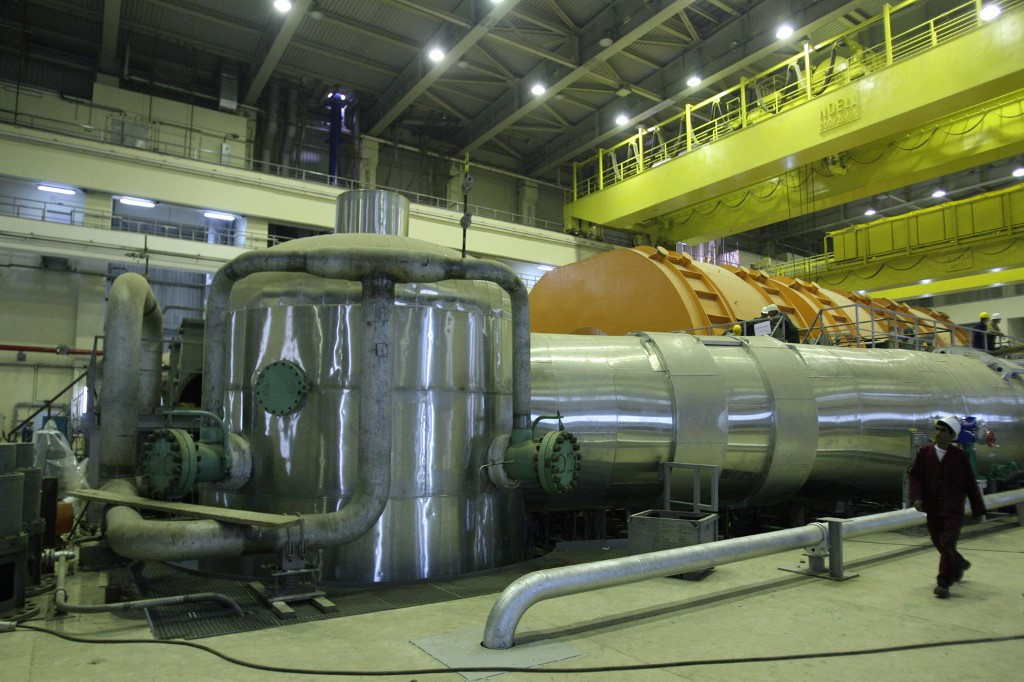Popular Reads
Top Results
Can't find what you're looking for?
View all search resultsPopular Reads
Top Results
Can't find what you're looking for?
View all search resultsIran passes uranium enrichment cap set by endangered deal
Iran surpassing the cap and reaching 4.5 percent enrichment was announced by the country's atomic energy organisation spokesman Behrouz Kamalvandi.
Change text size
Gift Premium Articles
to Anyone
 A file photo taken on October 26, 2010 shows the inside of reactor at the Russian-built Bushehr nuclear power plant in southern Iran, 1200 Kms south of Tehran. Attention is once again focused on how close Iran could be to a nuclear weapon, after Tehran said on July 7, 2019 it had started enriching uranium to a higher level than agreed in a 2015 nuclear deal abandoned by the US. Iranian officials have hinted they may go up to five percent, the level needed to produce fuel for Iran's only nuclear power station at Bushehr. (AFP/Hamed Malekpour/Far News Agency)
A file photo taken on October 26, 2010 shows the inside of reactor at the Russian-built Bushehr nuclear power plant in southern Iran, 1200 Kms south of Tehran. Attention is once again focused on how close Iran could be to a nuclear weapon, after Tehran said on July 7, 2019 it had started enriching uranium to a higher level than agreed in a 2015 nuclear deal abandoned by the US. Iranian officials have hinted they may go up to five percent, the level needed to produce fuel for Iran's only nuclear power station at Bushehr. (AFP/Hamed Malekpour/Far News Agency)
I
ran on Monday breached a uranium enrichment cap set by a troubled 2015 nuclear deal and warned Europe against taking retaliatory measures, as France decided to send an envoy to Tehran to try to calm tensions.
The move came more than a year after Washington pulled out of the landmark accord between world powers and Tehran, which says it has lost patience with perceived inaction by the remaining European partners.
After Tehran's latest step, US President Donald Trump held talks with his French counterpart Emmanuel Macron on "ongoing efforts to ensure that Iran does not obtain a nuclear weapon and to end Iran's destabilising behaviour in the Middle East", the White House said in a statement.
Iran surpassing the cap and reaching 4.5 percent enrichment was announced by the country's atomic energy organisation spokesman Behrouz Kamalvandi.
"This level of purity completely satisfies the power plant fuel requirements of the country," he said, quoted by the semi-official ISNA news agency.
Kamalvandi hinted that the Islamic republic might stick to this level of enrichment for the time being, which is well below the more than 90-percent level required for a nuclear warhead.
The UN nuclear watchdog, the International Atomic Energy Agency (IAEA), confirmed that Iran had enriched uranium to a level above the deal's cap.
The IAEA said its inspectors "on 8 July verified that Iran is enriching uranium above 3.67 percent U-235".
The European Union said it was "extremely concerned" by the development and called on Iran to "reverse all activities" inconsistent with its deal commitments.
France, Germany and Britain -- the European partners of the international deal -- also urged Tehran to halt its advance towards breaching the cap, as Paris said it was sending a special envoy to Tehran on Tuesday and Wednesday to try and "de-escalate" tensions.
'Skip next steps'
Iran's foreign ministry warned against any escalatory response.
If the Europeans "do certain strange acts, then we would skip all the next steps (in the plan to scale back commitments) and implement the last one", ministry spokesman Abbas Mousavi said.
He did not specify what the final step would be but President Hassan Rouhani had warned previously that Iran could leave the nuclear accord.
Foreign Minister Mohammad Javad Zarif reiterated that Iran's actions could be reversed if European partners deliver on their part, insisting there was no better pact than the 2015 deal, of which he was a key architect.
"As it becomes increasingly clear that there won’t be a better deal, they're bizarrely urging Iran's full compliance. There's a way out," he tweeted.
US 'bullying'
US Secretary of State Mike Pompeo tweeted Sunday that Iran would face "further isolation and sanctions".
China and Russia, the other deal partners, both blamed the United States for the latest step by Iran.
Beijing accused Washington of "unilateral bullying", while Moscow said passing the enrichment cap was one of the "consequences" of the White House abandoning the deal.
Macron held an hour-long conversation with Rouhani on Saturday and said he wanted to "explore the conditions for a resumption of dialogue between all parties" within a week.
His envoy Emmanuel Bonne will visit Iran "to piece together a de-escalation (strategy), with the actions which need to be taken immediately before July 15", the French presidency said Monday.
Iran's Deputy Foreign Minister Abbas Araghchi on Sunday singled out declining oil sales and the effect of financial sanctions as the main issues that needed to be solved.
Otherwise, he said, Tehran would further step back from its nuclear commitments.
Iran says it is not violating the deal, citing terms of the agreement allowing one side to temporarily abandon some of commitments if it deems the other side is not respecting its part of the accord.
According to Middle East analyst Sanam Vakil, Europe would need to engage Iran and the US simultaneously to prevent the situation escalating even further.
"A 'freeze for freeze' is the most immediate goal; keeping Iran within the JCPOA and then sanctions relief from the Trump administration," Vakil, a senior research fellow at the Chatham House think-tank in London, told AFP referring to the Joint Comprehensive Plan of Action nuclear deal.
Rouhani in May flagged Tehran's intentions to start enriching uranium above the agreed maximum purification level of 3.67 percent.
The IAEA confirmed this month that Iran has exceeded a 300-kilogramme limit on enriched uranium reserves, another cap that was imposed by the deal.









